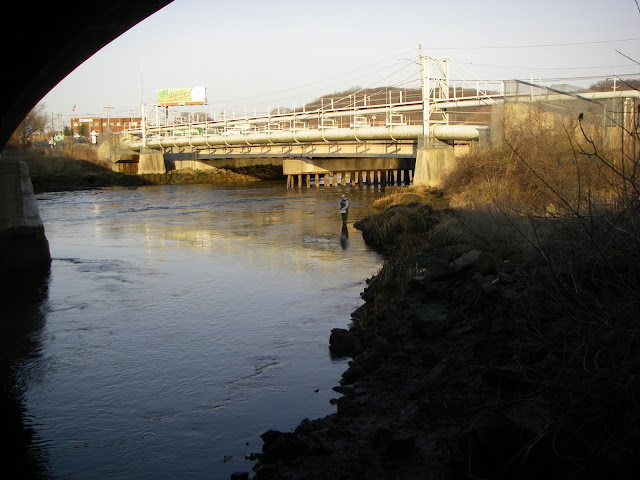 |
| No, this is not the spot. |
I took the kids to daycare
on Mondays, Wednesdays and Fridays but my wife’s part-time job left Tuesday and
Thursday mornings for fishing. If I was on the road by 3:30am, I could be
fishing by about 4:00am, leave when the bite slowed, and still arrive at work
by 8:00am, long before anybody else.
Unlike my other co-workers, though, I was a worthless bag of protoplasm
by about 2:00pm because of sheer exhaustion.
And if the fishing had been good, I’d get almost nothing done because
I'd replay the events in my head all day and plan the next trip. When I would roll into my job at the Ivy
League university where I worked with “bass thumb”, I’d look at all the
geniuses around me and say to myself “I know things you don’t know.”
I loved everything about the
striper scene I came to know in my few years on the east coast. I liked the
gritty industrial environment, including not just the rusted cranes and
decaying buildings, but the people as well. I saw Augie a few times when I met
others there to fish weekends or nights but he left once there was a crowd,
which to him seemed to mean more than one or two other anglers. Once I started my pre-dawn Tuesday-Thursday
routine, though, he and I were often the only two fishing and before long we
started to expect each other. One morning as we were leaving, Augie said to me
"I want to show you a different spot on Thursday. You can't fish this spot except at the bottom
of a big moon tide, but it will be right Thursday.
There will be herring too, so bring big flies. Don't tell anybody." He gave me
directions to the spot and I realized immediately that although I’d never
fished it, the spot he was referring to was, in fact, hardly a secret. It was popular
with bait fishermen and plug casters; I'd read reports on one of the local
internet forums. But he was right about
one thing: because there was no backcast room under most conditions, we could
fly fish the spot only when we could wade far enough from the bank and this
could only be done at the lowest of lows.
I got there early and alone.
As Augie had said, the tide was low enough that I could wade far enough out for
a backcast and still be only waist deep
It was 3:45 am when Augie arrived 15 minutes after I'd started and though
he hadn't seen me catch the three 30 inch fish I’d already landed, as he waded
out he smiled and said "It's good, isn't it?"
At the next tide cycle I was
back in our spot one morning and saw Augie in the distance. I waved and asked him if he was having any
luck and he shouted back something I couldn’t make out. When I got closer, he shouted again and this
time I could clearly understand him: “Get out!
You told!”
“What?” I said as I got
closer. Apparently one morning Augie had
run into two of my friends in the same spot.
He knew these guys well and saw them often, but never here, in the
morning, on a moon tide, during the herring run.
“You told. How else would they know when to come?” he
shouted.
“It’s a moon tide,
Augie. Everybody knows this.”
“How did they know to bring
big flies?”
“It’s the herring run. Everybody knows this, too.”
The truth of the matter was
that folks were talking about the herring run, and big stripers, on all of the
local internet boards. Augie didn’t know this because he didn’t use the
internet - at all. He simply had no use for it. I was angry that he was blaming
me for the arrival of two fishermen when the knowledge necessary to predict
that this was the place to be was free for the asking to anybody willing to do
a little internet research. But although I hadn't admitted this to him, he was
right: I had told my friends about my success.
I just couldn't keep my big fucking mouth shut about it. I think if
Augie had known everything – the public advertisements, the internet chat
boards – his reaction would have been the same.
I’d revealed to him that I wasn’t one of them - "them" being
members of the secretive and serious striper angler society. That morning he seemed more disappointed than
angry. It was the last time we
spoke. I never fished there again, and
two years later my career took me far from the ocean.
The urban striper sharpie
has to solve a multidimensional puzzle that includes all the challenges of
access (including, sometimes, not just getting to the water but also doing so
without getting mugged, or worse), but also the timing of tides, river herring
migration and light. What this means is
that by revealing a spot - a physical location - you’ve committed perhaps a
minor misdemeanor. But if you reveal not
just one, but all of the dimensions, the penalties can be severe. You serve your sentences for revealing tide,
season, light and location consecutively.
[This piece was published in
a slightly different form in the Spring 2015 issue of "The Drake"
magazine. Thanks to Tom Bie and
"The Drake" for putting it out there.]
No comments:
Post a Comment